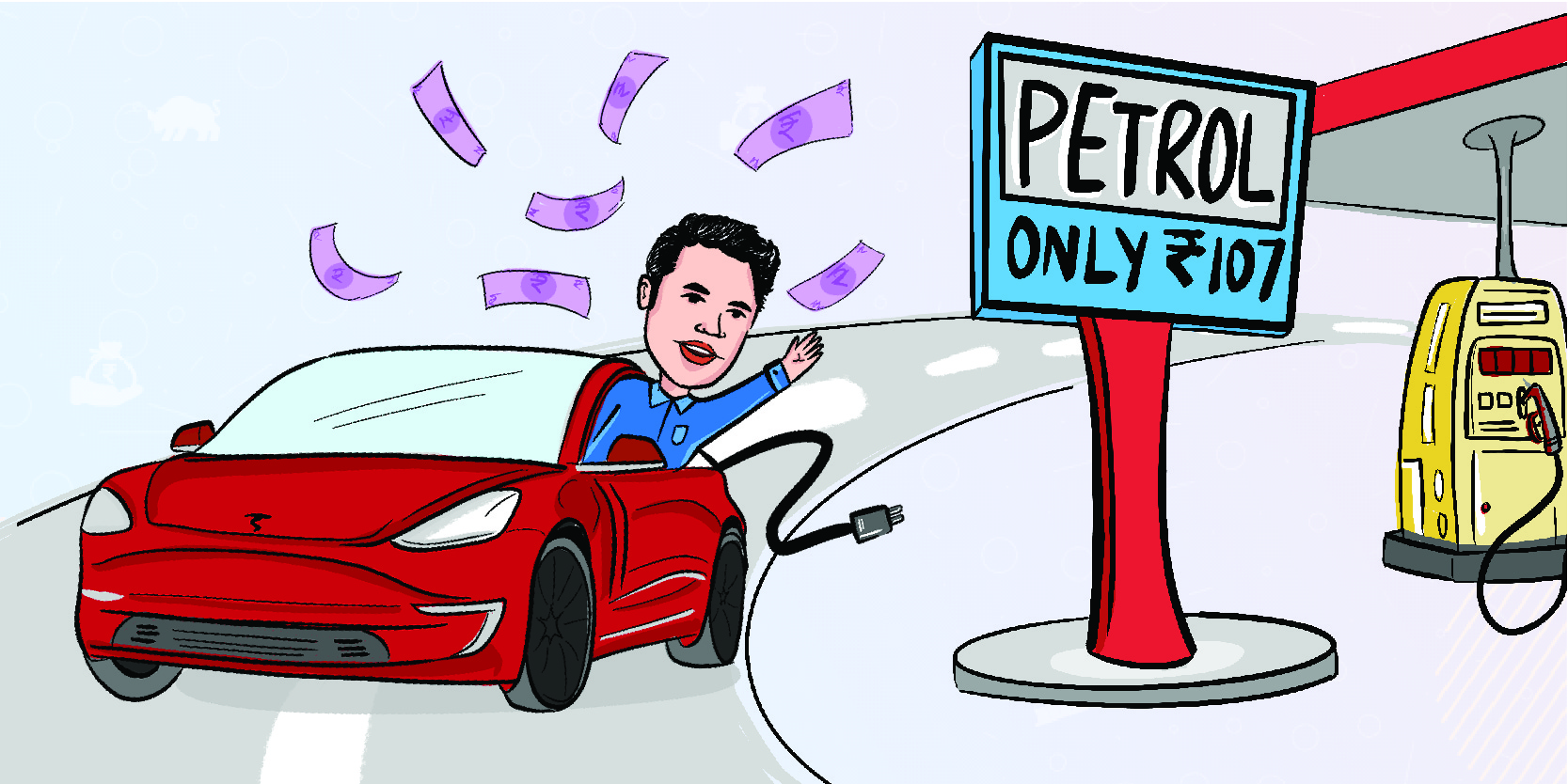India’s EV Saga – Growth, Challenges & Way Forward5 min read
Ola’s electric scooters, Maruti Suzuki’s electric vehicle and Amara Raja Batteries’ Lithium-ion assembly plant!
Well, with petrol prices crossing Rs. 100 per litre in cities, could there be a better time?
The automobile industry around the world is witnessing a revolution and is trying to switch to alternative energy-intensive options. India is also part of this revolution and is doing everything in its capacity to build on alternative fuel.
These alternative technologies are mainly based around electric vehicles with many companies jumping on the bandwagon to get some traction before the industry gets a radical shift away from traditional fossil fuels.
With the option of 100% FDI, the electric vehicle industry in India is picking pace. We are already starting with new manufacturing hubs, and an increased push to improve charging infrastructure.
Government subsidies for Indian-made electric two-wheelers as well as a boost for localized ACC battery storage production are major growth drivers for the Indian EV industry.
Why Electric?
Globally, many countries are adopting electric vehicles as an alternative due to climate change.
As per the Environmental Pollution index, India is ranked 168 out of 180 in terms of air quality. One of the strategies adopted to combat this has been the push for electric vehicles (EVs).
This will not only improve the environment but also India’s overall economic health. India currently imports crude oil which sets us back in a deficit of approx $60 billion.
The aim set by the government has been 100% electrification by 2030. This is a humongous target considering the early stages of adoption that we currently are in.
The electric vehicle adoption rate in India is less than 1% according to a McKinsey&Company report.
According to Bloomberg, in the six years leading up to October 2019, India has barely sold more than 8,000 electric cars. If we compare this figure to developed countries like China, these sales figured are achieved in less than 2 days.
As per reports, some state governments realizing their role have tried to eradicate one of the major barriers to owning an EV i.e. the high initial cost.
This can be seen in the example of Maharashtra where subsidies were reportedly announced amounting to 1 lakh for electric vehicles. Consequently, Maharashtra had the highest sales volume since 2017 in the Indian electric car market. The government has also realized that it is best to target their efforts towards the public transport system in the initial stages.
This is because the purchase of EVs in the private sector will depend on major other factors like attractiveness etc. The public transport system being one of the most heavily used in a country like India will definitely offer a huge boost to the sector.
Challenges faced by EV industry
Insufficient charging infrastructure
Lack of sufficient charging infrastructure is one of the primary reasons why customers often refrain from purchasing EVs.
High costs
The major concern among the potential customers is the current high price of EVs. As compared to lower-end (internal combustion engine) ICE cars, electric cars in the same segment tend to be more expensive.
However, with the recent announcement of subsidies, the price rationalization of EVs in the two-wheeler segment is on cards.
Lower mileage
As of today, EVs in India are not cost-competitive to an average customer as internal combustion engine (ICE) vehicles prove to be more cost-effective.
Higher dependency on imports
Reliance on imports of batteries as well as other components is also one of the factors adding to the cost of EVs in India.
Stocks That May Benefit Due To India’s EV Push
Considering this, there are few companies that can be focused on by investors.
Maruti Suzuki
One of the largest and trusted automobile companies in India is reportedly all set to to launch its electric vehicle Maruti Suzuki Wagon R electric vehicle in the second half of 2021.
Provided the infrastructure developments also go hand in hand with the launch of electric vehicles, the car will see a good sale in the future.
Amara Raja Batteries
As the main component of electric vehicles is a battery, India’s second-biggest traditional battery maker Amara Raja is looking to build a Lithium-ion assembly plant soon.
The firm is already working in collaboration with different state governments to promote the use of electric vehicles.
They have collaborated with the Delhi government to set up a charging station. Amara Raja launched EV charging stations and battery swapping stations in collaboration with Tirupati Municipal Corporation along with a fleet of electric auto-rickshaws as part of the central government’s Smart Cities program.
Minda Industries
World’s best performing Indian auto parts maker Minda Industries will get a boost from the electric vehicle market.
The company is in touch with original equipment manufacturers for possible EV-compatible systems and is evaluating existing products to see how they will fit into the market. The company has already increased the R&D costs to enter the electric vehicle segment to capitalize on the opportunity.
Way Forward
The Indian automotive industry is the fifth-largest in the world and is slated to be the third-largest by 2030. Catering to a vast domestic market, reliance on the conventional modes of fuel-intensive mobility will not be sustainable.
In an effort to address this, federal policymakers are developing a mobility option that is “Shared, Connected, and Electric” and have projected an ambitious target of achieving 100 percent electrification by 2030.
According to an independent study by CEEW Centre for Energy Finance (CEEW-CEF), the EV market in India will be a US$206 billion opportunity by 2030 if India maintains steady progress to meet its ambitious 2030 target. This would require a cumulative investment of over US$180 billion in vehicle production and charging infrastructure.
Another report by India Energy Storage Alliance (IESA) projects that the Indian EV market will grow at a CAGR of 36% till 2026. The EV battery market is also projected to grow at a CAGR of 30% during the same period.
Disclaimer – This content is purely for informational purpose and in no way advice or a recommendation.




